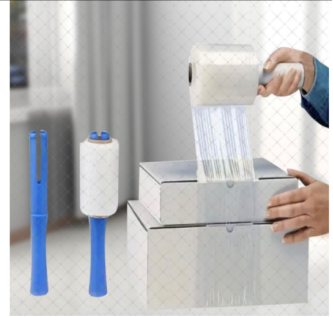biodegradable grease bags
The Rise of Biodegradable Grease Bags A Sustainable Solution for Food Packaging
In recent years, the urgent need for environmentally friendly alternatives has driven innovation across many industries, including food packaging. One emerging solution is biodegradable grease bags, which offer a sustainable option for restaurants, food trucks, and consumers alike. These bags not only address the issue of plastic waste but also provide superior performance for packaging greasy or oily foods, making them an ideal choice for the food service industry.
Understanding Biodegradable Grease Bags
Biodegradable grease bags are specifically designed to withstand the challenges posed by moist and greasy food items. Traditional plastic bags can leach harmful chemicals and do not decompose, contributing to the global plastic crisis. In contrast, biodegradable grease bags are often made from natural materials such as paper, cornstarch, or plant-based resins. These materials break down under the right conditions, resulting in less environmental impact after disposal.
The main benefit of choosing biodegradable grease bags is that they prevent leaks while ensuring the food stays fresh
. These bags are often treated with water-resistant coatings that allow them to contain oily substances without compromising their integrity. As a result, they are ideal for packaging items like burgers, fried foods, and other greasy delights commonly found in the fast-food sector.Environmental Impact
The environmental benefits of biodegradable grease bags are significant. Traditional plastic bags can take hundreds of years to decompose, leading to significant pollution in landfills and oceans. By utilizing biodegradable options, businesses can actively reduce their carbon footprint and contribute to a healthier planet. These bags can decompose in commercial composting facilities within a matter of months, turning into nutrient-rich compost that can improve soil health.
Moreover, the production of biodegradable bags typically consumes less energy than the production of traditional plastics. This means a reduction in greenhouse gas emissions associated with their creation. For businesses, this translates into a positive brand image as consumers increasingly favor eco-friendly initiatives.
biodegradable grease bags

Consumer Demand and Market Growth
As awareness of environmental issues grows, so does consumer demand for sustainable products. Many consumers are actively seeking ways to reduce their impact on the planet, which includes supporting businesses that offer eco-friendly packaging. According to recent studies, nearly 70% of consumers are willing to pay a premium for sustainable packaging options. This shift in consumer behavior presents a significant opportunity for food establishments to differentiate themselves in a competitive market by adopting biodegradable grease bags.
The market for biodegradable packaging is projected to grow significantly in the coming years. This growth is driven not only by consumer demand but also by regulatory changes that impose stricter regulations on single-use plastics. Many cities and countries are implementing bans on plastic bags, making biodegradable options not just desirable but necessary for compliance.
Implementing Biodegradable Solutions
For businesses looking to transition to biodegradable grease bags, the process does not have to be daunting. Many suppliers now offer a range of biodegradable packaging solutions, including customized sizes and designs. Restaurants can begin by replacing a portion of their plastic packaging with biodegradable options and gradually increase their use as they see positive reactions from customers.
Additionally, education plays a crucial role in this transition. Businesses should inform their customers about the benefits of biodegradable bags, encouraging them to recycle properly and consider the environmental impact of their packaging choices. Marketing sustainable practices can enhance customer loyalty and attract environmentally-conscious consumers.
Conclusion
Biodegradable grease bags represent a vital step toward sustainable food packaging. By catering to the increasing demand for eco-friendly products, businesses not only contribute to environmental conservation but also position themselves favorably in a competitive market. As technology advances and materials improve, the future looks bright for biodegradable packaging solutions. Embracing these innovations is a crucial move toward a more sustainable food industry, benefiting both our planet and future generations. As consumers, we have the power to drive change with our purchasing decisions, supporting businesses committed to reducing plastic waste and embracing sustainable practices. If we collectively choose biodegradable solutions, we can pave the way for a greener future.
-
The Best Uses for Small Trash Bags in Daily LifeNewsJul.01,2025
-
Stylish Reusable Grocery Bags TrendsNewsJul.01,2025
-
Shipping Advantages of Using Bubble Envelopes BulkNewsJul.01,2025
-
How Compostable Mailing Bags Reduce Environmental ImpactNewsJul.01,2025
-
Environmentally - Friendly Bulk Poly MailersNewsJul.01,2025
-
Eco Friendly Custom Laminated Tote BagsNewsJul.01,2025
-
Have the freedom of customizing your custom mailers any way you want! Our dedicated packaging support will help deliver you the mailing experience you need to elevate your shipping experience to the next level! Start making a strong impression on your customers and stand out from your competitors! -
LIYA uses high quality raw materials which directly purchased from large enterprises domestic and overseas such as PetroChina, Sinopec, Sabic, Equate, ExxonMobil, Dow Chemical, Total, and Borouge, ensuring the price advantage and quality of the raw materials. -
LIYA uses high quality raw materials which directly purchased from large enterprises domestic and overseas such as PetroChina, Sinopec, Sabic, Equate, ExxonMobil, Dow Chemical, Total, and Borouge, ensuring the price advantage and quality of the raw materials.





